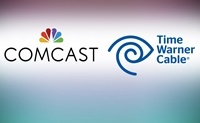Comcast-Time Warner Cable in talks to sell subscribers to Charter Communications
21 Apr 2014
With the fate of the $45.3-billion Comcast-Time Warner Cable merger hinging on US regulators and lawmakers, both media giants have entered into talks to sell between 3 million and 5 million subscribers to Charter Communications, Financial Times today reported.
 The two companies are talking to Charter, the company backed by cable industry veteran John Malone, about selling between 3 million and 5 million customers for as much as $20 billion, the report said.
The two companies are talking to Charter, the company backed by cable industry veteran John Malone, about selling between 3 million and 5 million customers for as much as $20 billion, the report said.
The report added that among the options being discussed are a spin off of these subscribers into a separate company and sell Charter a minority stake in the new company.
But Charter would squeeze the most from the deal since it was also eying Time Warner and had tabled a $61 billion bid only to lose out to Comcast. (See: Charter Communications offers $61 bn to buy Time Warner Cable)
Charter's bid of $132.50 a share for the much larger Time Warner included $37 billion in cash and stock and the rest in debt assumption, while Comcast had offered $158.82 per share, excluding debt. (See: Time Warner Cable to merge with Comcast in $45-bn deal)
While announcing the friendly deal, Comcast had said that it would divest 3 million pay TV subscribers after the deal closes in order to allay antitrust concerns.
With Time Warner 's 11.2 million pay TV customers and 22 million of Comcast, the merged company will have a total subscriber base of around 30 million when the deal is completed, which is about a third of the total US market.
The mega-merger, which does not have a break-up fee, has to be approved by the US Federal Communications Commission and the US Justice Department.
Early this month, executives from Comcast and Time Warner Cable were grilled by federal lawmakers on the merger between the nation's two largest cable companies.
David Cohen, Comcast's executive vice president, told lawmakers that the two companies' service markets do not overlap, and the merger would not result in higher prices for cable TV and internet packages.
Senator Al Franken, one of the most outspoken critics of the deal, has said that Comcast would be the dominant pay-TV and internet provider in 19 of the top 20 markets, which would allow it to dictate prices.
Comcast, the parent company of CNBC and NBC, had been quietly considering a deal with Time Warner Cable for some time, but was reported to have been seeking advice on possible regulatory hurdles if it were to pursue a bid.
The merger would create one giant programming provider covering over 60 per cent of subscribers in the US and account for one-third of all pay-television customers.
Though the US Federal Communications Commission had objected to this level of consolidation in the past, regulators had been stymied by the Court of Appeals for the DC Circuit, which had thrown out a rule prohibiting cable companies from controlling over 30 per cent of the industry.
The court found such a cap to be arbitrary, especially in the context of the rise of satellite television as an alternative to cable.



















